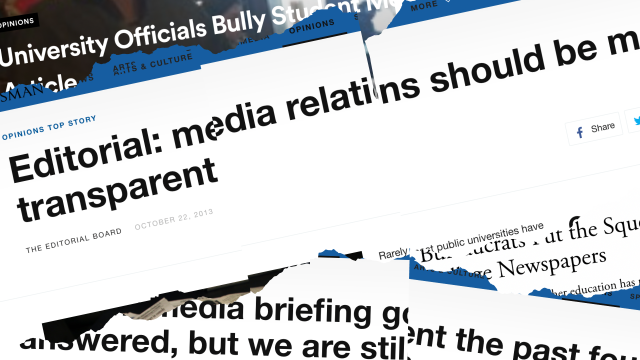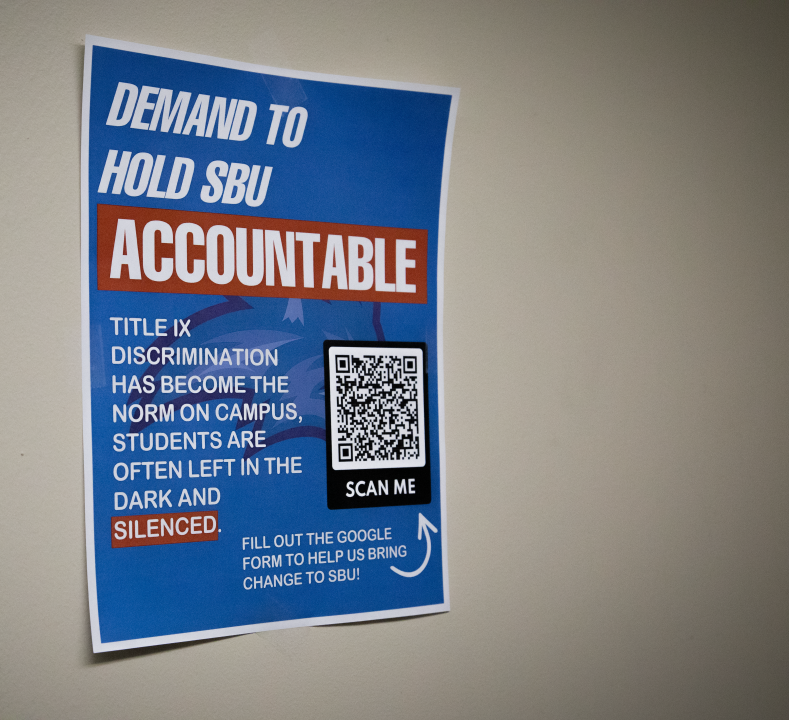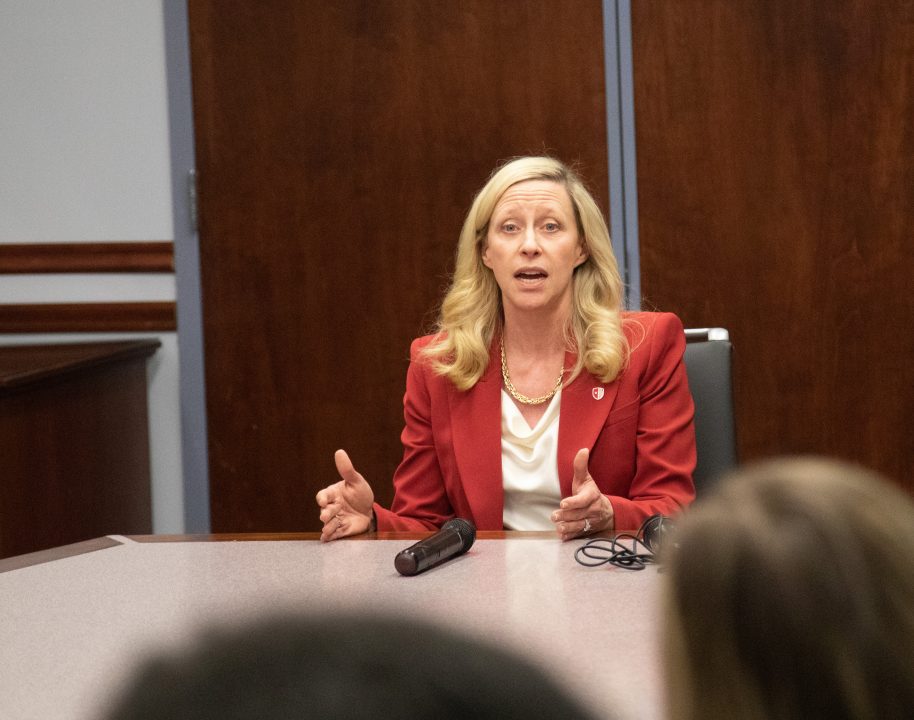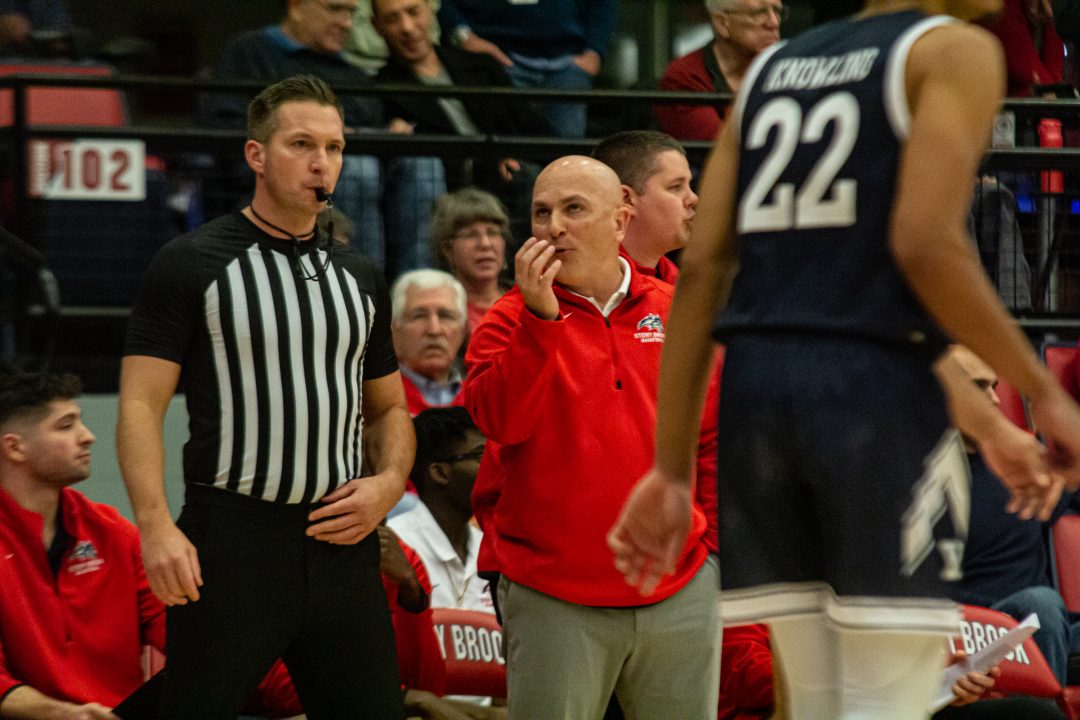
Before Lauren Sheprow joined Port Jefferson’s Board of Trustees and ran for mayor, she was the head of Media Relations at Stony Brook University.
During Sheprow’s tenure at Stony Brook, she faced extensive criticism from the student media — including The Statesman — for her relationship with the student press. In 2019, The Atlantic reported that Media Relations under Sheprow were so hostile to students that she sat down with a Statesman reporter who castigated her for writing a factually correct but unflattering article about then-President Samuel Stanley. And that’s before a writer for The Stony Brook Press alleged that Sheprow and two other University officials publicly cornered a Statesman editor in Starbucks about an article reporting the layoff of more than 20 professors.
Earlier this April, we reached out to Sheprow about her tenure at Stony Brook. In less than a day, the former Media Relations official gave us a characteristically taciturn reply: “My schedule is kind of crazy these days — can you send me some questions and I’ll get back to you?”
We had already learned that Sheprow introduced a “Journalism Students Inquiry” form, which required student journalists to submit questions to the department before asking them. These forms often went unanswered.
So we asked Sheprow about her record in Media Relations. Five days later, she had not followed up with us. We shot her another email and received no response.
More than a week has passed since Sheprow’s punctual first email to The Statesman. Her initial instinct to reply quickly seems to have vanished.
This isn’t a new development. Dating from 1996 all the way to the unanswered Freedom of Information Law (FOIL) requests currently sitting in The Statesman’s inbox, we’ve found various incidents indicating Stony Brook’s poor track record in communicating with the student press.
Sheprow’s record speaks for itself. Yet, more importantly, the students she intimidated can speak for themselves.
Rebecca Liebson was The Statesman’s news editor in 2018 and 2019. She was the hapless young journalist who Sheprow cornered about her reporting. Now, she covers real estate for the Tampa Bay Times in Florida.
“I definitely miss covering the University,” Liebson said in a phone interview. “I’d love to cover higher education again at some point in my career … What goes down on a college campus really does reflect how our government works at large.”
Liebson was in her sophomore year when she covered a University Senate budget meeting. The meeting saw President Stanley address Stony Brook’s then-$35 million deficit. In her article for The Statesman, Liebson stated that “Stanley kept his head down for the majority of the meeting, both literally and figuratively, standing on the far left side of the room, his hands tightly clasped.”
“[Sheprow] called me into her office,” Liebson said. “But she wouldn’t tell me beforehand what she was summoning me for. So I went to her office, and basically, there was nothing factually inaccurate in the article. She just didn’t like that I said that President Stanley had his head in his hands.”
Stanley’s recent resignation as president of Michigan State University (MSU) following a failure to come clean about a dean’s misconduct allegations did not surprise Liebson.
“At the time, MSU was dealing with the Larry Nassar allegations,” Liebson said, referring to MSU’s women’s gymnastics coach who sexually abused hundreds of athletes. “People at Stony Brook felt like Stanley had done so poorly at Stony Brook that [MSU] was really the only gig that he could get if he wanted to leave. There was always a sense that Stanley viewed Stony Brook as a stepping stone to get to a larger university.”
Stanley and Sheprow weren’t the only officials to dodge accountability. Sacha Kopp, former dean of the College of Arts and Sciences, had a representative at the Starbucks meeting as well.
We reached out to Kopp, but his secretary told us there were more appropriate people to interview.
The history goes further back than a few years ago. A 1996 incident with Polity — now known as Stony Brook’s Undergraduate Student Government (USG) — resulted in the Supreme Court of New York stepping in to correct the Student Polity Association’s actions after it was decertified in 2002.
The Statesman was forced to sue Polity after the organization refused to follow FOIA protocol and release all contracts and paperwork pertaining to NIA Entertainment, a media consulting firm based out of Washington D.C. that was hired to assist 3-TV.
3-TV was a student-run television station that was revived in 1992 by Polity to give students the opportunity to get hands-on experience in television.
Since 1994, The Statesman had reason to suspect something was amiss between Polity and NIA Entertainment. Several sources alleged that the relationship was a conflict of interest when The Statesman had been investigating other incidents from Polity.
Polity’s argument for denying the FOIL request was that public disclosure laws didn’t apply to them since they were a “private organization.” State University of New York (SUNY) central supported Polity’s reasoning after The Statesman appealed, saying that they were a not-for-profit organization and not a state association.
In response, The Statesman filed a lawsuit on August 7, 1995. In January of 1996, Justice Vincent G. Bradley granted the FOIL request and mandated that Polity pay a percentage of the legal fees.
Unsurprisingly, the refusal to release the documents involved an individual that would have to face the consequences: Polity’s former President Crystal Plati. Plati secured the contract with NIA Entertainment but didn’t disclose her personal relationship with the head consultant at the firm and former Polity President David Greene.
The contract had suspicious origins and managed to evade many steps on the path for approval. After the contract had been faxed to Polity, it stated that it had been approved on two separate dates — but the minutes from those days neglect to mention any meeting. There was no evidence that NIA Entertainment was a legal corporation in either New York or Washington D.C. On the day the contract was faxed, 3-TV submitted a voucher for $3,000 that was approved the same day by Peter Baigent, the former dean of students. This was unheard of for clubs, and the way it was pushed quickly and quietly suggested that something scandalous was afoot.
Student journalists are workers – often unpaid ones. When the university administration attempts to exert power over us, our editorial independence is threatened. Declining to provide us with answers only adds insult to injury.
Disturbingly, the administration can get away with it.
“Because fewer people read student media, the administration seems to feel less of a need to be accountable to them,” Liebson said. “But I think that dealing with that as a student journalist prepared me for the real world … Student journalists are faced with greater barriers than a professional journalist is.”
Which leads us to today. The new administration headed by Assistant Vice President of Communications Peter Thorne stated his team’s intentions when we reached out for comment.
“Our goal is to work collaboratively with the media, including student media organizations, to ensure that accurate and informative coverage is provided to the campus community and the broader public,” Thorne said. “By working together, we can ensure that information of interest to the university and the wider community is available in an accurate and timely manner.”
Only time will tell if the Media Relations team follows through on those intentions. However, those at The Statesman have an obligation to the student body to report on events in an accurate and timely fashion — we can only hope that our institution’s various administrations will assist us in that pursuit.



















